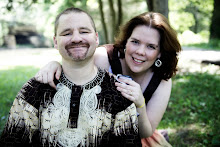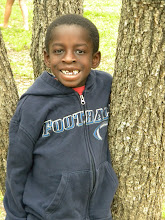Comments--Followup to "Orpans"
This post is in response to the post before it--Orphans and comments that have been left.
First, thanks so much to Beckie Sibley for your comment! I had no idea you read my blog either! LOL! I appreciated your post so much because it made me think about my own feelings on this issue. I truly don't think there is a "right" answer to any of this. All we have at this point is stop-gap measures (like small business start-up and international adoption) that may lessen the numbers of children who grow up living in orphanages.
Okay "anonymous" posters! I've got ya now! I've turned of anonymous posting. I love to hear what you say, but it's so hard for me to give your words the respect that they deserve when you don't sign your name. Yesterday's post was kind of hard for me to put out there because I knew some would disagree with my stance and others would misinterpret it. As I stated in my post yesterday I'm very conflicted about what we can do to lessen the number of orphans in Africa, so I want to hear what you have to say. Maybe it will broaden my thoughts--IF YOU SIGN YOUR NAME! =-)
A few things that I don't think I made clear in my message yesterday but want to address since it's been mentioned in comments.
I am not one of those people who is all into "saving" children that don't need to be saved. The whole thing that happened with Zoe's Ark recently really makes me feel sick to my stomach. There are literally millions of orphans in Africa that are in need of a permanent and loving family. What are we doing trying to create them?! Hideous. However, my definition of a child in need of adoption might be different than others. Just like children in the US with abusive or neglected guardians need to be placed into permanent families, so do children in Africa with the same lack of care--whether they are currently living with bio family or not. "Inherited orphans" who are living with family who neglect them have the right to a safe and loving home. Biological family does not automatically equal the BEST interest of the child.
Here's my own view of what needs to happen before international adoption is considered an option (and also what I hope all agencies/countries do in order to determine if the child is truly in need of international placement).
1. Council the family about ALL of their options (including replacement within the family, adoption, or modifying the current placement to fit the needs of the child). Refer them to other organizations that may be able to help if it is a short term issue (no food for the month, etc.).
2. Ask guardians if there is anybody else in the family (or outside) that they know of who can care for the child well.
3. If family is leaning towards adoption, counsel family about what adoption is (as it is not well understood by many families in the beginning). Adoption is permanent. Adoption means you may never see the child again. Adoption means the child won't return to your family--ever. Adoption means you sever all legal ties to the child.
4. Determine whether the child can be adopted domestically. In Ghana, this is only likely for kids under 3 in very good health, usually only girls (but thanks be to God that there IS an active domestic adoption program there)!
5. If the child can't be placed with another friend or family member...is in need of permanent care...isn't a candidate for domestic adoption...and the family understands what international adoption is...THEN procedures can begin to take the child into care for future international adoption.
Most Ghanaians (at this point) seem to be highly in favor of international adoption. In fact, it is we--the US entity--that makes the choice not to take in children that could be adopted domestically (as domestic adoption is by far the better choice if possible). What we have to watch for is families who are in good standing that want to place their children for adoption just so they can go to America. Not okay--ever. It's SO important that agencies placing children for international adoption make sure that they are ONLY placing children who truly have no other alternative.
We are lucky in Ghana that the Department of Social Welfare has very similar goals for the children as US placing agencies should. First--see if additional support would allow the child to stay with family or friends. Second, see if domestic adoption is possible for the child. Third, consider international placement for the child. Fourth, arrange for long-term foster care. The LAST option would be a child growing up in a residential children's home. Everybody agrees that this is the least desirable outcome for a child who has no family to properly care for them.
This is such a very deep issue. I don't know if anybody could fully express every aspect of the issue and their feelings on it without writing a book. I know I can't. =-)
Anita










3 comments:
Anita, have you read Erin's post titled "Transracial adoption - About the kids"? She does a very very good job of explaining it all, much along the same lines of what you said. http://transracial.adoptionblogs.com/index.php/weblogs/transracial-adoption-about-the-kids-1
is the link. It's a long link, I'm sorry if it makes the page appear all wonky. I agree wholeheartedly with the steps that need to be taken. We want to make absolutely sure that 1)their first family understands what this means legally, and 2)that there really are no resources for the child should they remain in their birth country.
Blessings!
Jenny
Thanks for the comment!
This post is awesome do you care if I link to it?
Jena--not at all. You and I have definitely been thinking about some of the same things lately! Your post blessed me tonight.
Anita
Post a Comment